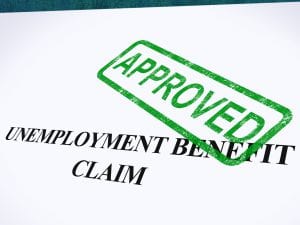If I File For Bankruptcy, Will I Lose My Unemployment Benefits?

About Unemployment Benefits
Unemployment insurance is a collaborative state and federal program that offers people temporary financial payments to cover the loss of a job through no fault of their own. And recently, due to the Coronavirus pandemic, the federal government passed another set of laws that temporarily extends these benefits an additional 13 weeks while also offering increases on typical unemployment insurance amounts. More information about these new laws, called the Coronavirus Aid, Relief and Economic Security (CARES) Act, can be found here. During this unprecedented time, these benefits are aimed at helping individuals and families through the staggering job losses that have occurred.
The Type of Bankruptcy Matters
Losing a job is a very common reason for filing for bankruptcy, but it is important to understand the differences between Chapter 7 bankruptcy and Chapter 13 bankruptcy. Basically, an individual may file for Chapter 7 bankruptcy while collecting unemployment, but will be required to pass a “means test”. Meanwhile, filing for Chapter 13 bankruptcy could present a problem for those who are unemployed.
Chapter 7 Bankruptcy While Unemployed
For those who are unemployed, have a significant amount of debt and do not own many assets, filing for Chapter 7 bankruptcy is generally the best bet. In Maryland, debtors with an average household income that is below the median income in the state will pass the “means test” and may file for Chapter 7 bankruptcy. In this case, creditors will only receive payments if the filer has non-exempt assets that can be sold in order to pay back debts. In many Chapter 7 bankruptcy cases, debts are fully forgiven and are wiped away. In Maryland, unemployment benefits must be included in calculating average household income, but social security benefits do not need to be included in this calculation. It’s important to note that this requirement is different in many other states.
Chapter 13 Bankruptcy While Unemployed
In a Chapter 13 bankruptcy, debtors are required to pay back debts to creditors over a period of 3-5 years. This can be incredibly difficult to do while unemployed, particularly if there are not a lot of job prospects on the horizon. Because Chapter 13 bankruptcies involve paying back debts, filers must be employed or have income from another source that can be verified, such as unemployment benefits or social security.
Experienced Bankruptcy Attorneys
A job loss during an unprecedented economic time is incredibly stressful, particularly when you may be concerned about your health or the health of loved ones. Bankruptcy is a financial tool that can help you get out of debt and start over with a clean slate, but it’s very important to consult an experienced attorney who is well versed with the bankruptcy laws in your state. At Sirody & Associates, our attorneys have deep knowledge of Maryland bankruptcy law. We are available to meet with you over the phone or by video conference to give you the information you need to make the best decision for your unique circumstances. Contact us online today – we can help you make a fresh start.
